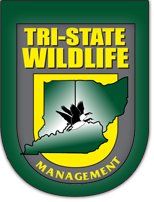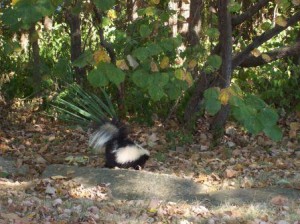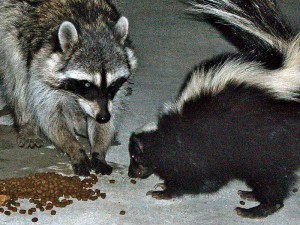You’re all set for a wonderful Valentine’s Day. You’ve bought the perfect gift and you have a romantic home cooked meal planned for that evening. You leave your house to buy the groceries for the meal and it hits you, the notorious odor from a skunk. It will be lingering for days and it’s too late to get dinner reservations at any decent restaurant. This is no surprise to those of us in the wildlife business. January and February marks the beginning of skunk mating season in the Northern Kentucky/Cincinnati area.
The onset of breeding season means skunks will begin traveling more frequently and further in search of a mate. If you’re lucky, a skunk you see (OR SMELL) on your property could just be a passerby. Typically, skunks stay in a 1/2 to 2 mile diameter area, but during mating season, a male may travel 4 to 5 miles a night. Due to increased travels, you will likely start seeing more skunks hit on the roads. You will also begin smelling skunk musk for a variety of reasons related to an increase in travels. First and foremost, when a skunk is hit on the road, their anal glands that store their musk rupture. Secondly, skunks in an unfamiliar territory encounter dogs, cats, raccoons, etc., and they spray to protect themselves. Thirdly, a male skunk may spray another suitor to ward him off, and lastly a female may spray a male if uninterested.
Usually when a customer calls Tri-State Wildlife Management about a skunk problem, it’s because they smell the skunk rather than see it. Skunk musk can be smelled from a mile away. In addition, if an animal or area has been sprayed by a skunk, it will linger for quite some time. This can make it difficult for businesses and homeowners to determine whether they actually have a skunk problem. So, how do you know if you have a skunk problem? Customers typically call Tri-State Wildlife Management with a skunk problem either after smelling strong skunk spray or after seeing one. Skunks typically live under manmade structures ,such as porches, stoops, sheds, and decks. Sometimes, customers don’t even realize that there is a hole dug out from under the bottom of their porch for animal entry, and oftentimes even if they do, customers assume chipmunks are the culprit.
Tri-State Wildlife Management can take care of your skunk problem for you. Our courteous staff works for you to provide a cost effective solution to your skunk intrusion and/or damage issue. As a full service company, we initiate an Integrated Wildlife Management Program beginning with an inspection and customer education, followed by removal of intrusive skunks and repair of skunk damage. TSWM also offers skunk deodorizing services as well as prevention services, including habitat modification and barrier wall and fencing installation.
We strive for the most humane and environmentally effective techniques for dealing with wildlife problems. Tri-State Wildlife Management’s use of modern innovative methods provides sound wildlife management services to ensure the protection of our customers’ investments and health. TSWM is fully insured, and we stand behind all of our work.
Tri-State Wildlife Management – Protecting You, Your Property, and Your Investments












